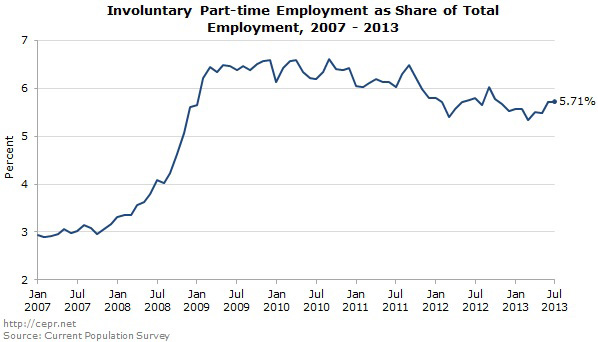
The restaurant and retail sectors accounted for more than half of July’s job growth.
The Labor Department reported the economy added 162,000 jobs in July. Job growth for the prior two months was also revised down by 26,000, bringing the average growth over the last three months to 175,000. On the positive side, the household survey showed the unemployment rate falling to 7.4 percent, the lowest level since December of 2008. The employment-to-population ratio (EPOP) remained unchanged at 58.7 percent.
More disturbing than the slightly weaker-than-expected job growth number was its composition. Retail trade added 46,800 jobs and restaurants added 38,400, meaning that these two low-paying sectors accounted for more than half of all job growth in July. By comparison, they accounted for 46.8 percent of the job growth over the last three months and 32.2 percent of job growth over the last year. The rapid growth of jobs in these sectors is more likely an indication of the state of the labor market than the nature of job creation. Businesses in these sectors often want to hire people but can’t find workers. In a weak job market desperate workers will take even the lowest-paying jobs.
There were few notable areas of growth outside of these sectors. Professional and technical services added 21,100 jobs, almost exactly in line with its 20,000 average over the last year. Wholesale trade added 13,700 jobs, somewhat above its 7,000 average for the last year. Construction employment fell by 6,000. It has been virtually flat since February. Manufacturing added 6,000 jobs in July, but it has seen little net change since January. With the average work week falling by 0.3 hours in construction and 0.2 hours in manufacturing, there is little reason to expect any turnaround in these sectors any time soon.
Health care added just 2,500 jobs, the smallest gain in a decade. This brings the three-month average to just 8,800. Until the last few months job growth in the sector had been averaging over 20,000 a month. If this slowdown persists, that will be good news from the standpoint of containing costs but bad news in a seriously underemployed economy. The government sector gained 1,000 jobs, with a drop of 3,000 jobs in the Postal Service being offset by gains at the state and local level.
The average hourly wage fell in July, but this was after a big jump in June. It has increased at a 2.0 percent annual rate over the last three months.
There were a few noteworthy items in the household data. The unemployment rate for black women fell by 1.5 percent to 10.5 percent, the lowest level since it was at 10.4 percent in March of 2009. The EPOP for Hispanics has been continuing on an upward trend, hitting 60.4 percent, 0.7 percentage points above its year-ago level. Foreign-born workers appear to be doing somewhat better than native-born workers in recent data. The EPOP for foreign-born workers is up 0.7 percentage points over the last year and is 2.9 percentage points above its low point for the downturn in January of 2010. By contrast, the EPOP for native-born workers is up just 0.1 percentage points from its year-ago level and 1.3 percentage points from its low in January of 2011.
The duration measures were mixed, with average duration and share of long-term unemployed rising slightly and the median duration falling. The drop in the median duration to 15.7 weeks put the median at its lowest level since May 2009. There was little change in the number of involuntary part-time workers, with the numbers slightly below the year-ago level.

One disturbing item in the household data is a sharp drop in the number of people with disabilities who are working over the last year, with the data showing a decline of 8.0 percent from a peak in October of last year. This is coupled with a 1.1 percentage point year-over-year rise in the unemployment rate.
On the whole this report suggests a slowing economy. The drop in average hours pushed the index of total weekly down to its May level. This falloff in hours, coupled with weak growth in the temp sector, is not a good omen for future job growth.
Angry, shocked, overwhelmed? Take action: Support independent media.
We’ve borne witness to a chaotic first few months in Trump’s presidency.
Over the last months, each executive order has delivered shock and bewilderment — a core part of a strategy to make the right-wing turn feel inevitable and overwhelming. But, as organizer Sandra Avalos implored us to remember in Truthout last November, “Together, we are more powerful than Trump.”
Indeed, the Trump administration is pushing through executive orders, but — as we’ve reported at Truthout — many are in legal limbo and face court challenges from unions and civil rights groups. Efforts to quash anti-racist teaching and DEI programs are stalled by education faculty, staff, and students refusing to comply. And communities across the country are coming together to raise the alarm on ICE raids, inform neighbors of their civil rights, and protect each other in moving shows of solidarity.
It will be a long fight ahead. And as nonprofit movement media, Truthout plans to be there documenting and uplifting resistance.
As we undertake this life-sustaining work, we appeal for your support. Please, if you find value in what we do, join our community of sustainers by making a monthly or one-time gift.